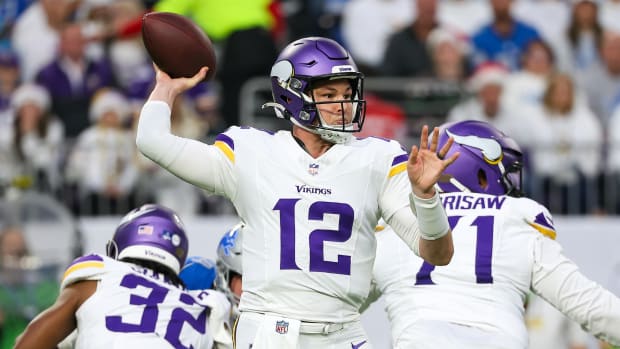
The struggles of backup quarterbacks can often lead to skewed perceptions, tempting fans and pundits to clamor for the return of the established starter. This sentiment has been evident as the Minnesota Vikings faced challenges in recent weeks, particularly with backups Josh Dobbs and Nick Mullens failing to impress.
In the aftermath of the Vikings’ loss to the Detroit Lions, featuring four interceptions by Nick Mullens, there is a growing inclination among fans to urge for Kirk Cousins’ return. The narrative suggests that if Cousins were in the lineup, the team would be in contention for the Super Bowl, especially considering that all their losses since Cousins’ absence have been by six points or less.
However, history serves as a reminder of the pitfalls of such thinking. The article draws parallels to the aftermath of the 2017 season when Case Keenum guided the Vikings to the NFC Championship. The subsequent introduction of Cousins, amid high expectations, did not result in the anticipated success. Despite making Cousins the highest-paid quarterback in history by guaranteed money, the Vikings only won one playoff game in the following five seasons.
The article emphasizes that the decision regarding Cousins should be divorced from the recent performances of backup quarterbacks. The primary goal for the Vikings is not merely to secure better quarterback play than Dobbs and Mullens but to construct a roster capable of winning a Super Bowl. The economic considerations of allocating resources for another significant quarterback contract, coupled with Cousins’ age and recent injury history, add complexity to the decision.
While acknowledging Cousins’ prowess as a quarterback with a commendable record and QB rating, the article highlights the economic realities of the NFL. The Vikings must assess whether committing to another substantial contract aligns with their goal of building a championship-caliber roster. The team faces critical decisions on contracts for key players, including Danielle Hunter, Justin Jefferson, Christian Darrisaw, Dalton Risner, and others.
The recent defensive struggles, surrendering 57 points against teams with elite weapons, add an additional layer of concern for the Vikings. The departure of key free agents, the need to address positions such as cornerback and running back, and the potential retirement of Harrison Smith further complicate the team’s offseason considerations.

The article cautions against making decisions based solely on the struggles of backup quarterbacks and underscores the importance of a comprehensive evaluation of the team’s overall strategy. While acknowledging Cousins’ capabilities, it stresses that the Vikings must weigh factors such as cost, projected performance, and the potential to transform the team into a Super Bowl contender.
Drawing examples from other teams’ quarterback transitions, the article acknowledges that parting ways with an expensive veteran is not always the right move. The success stories of teams like the Chiefs, Bills, and Ravens in transitioning to new quarterbacks contrast with instances where retaining veteran quarterbacks, as seen with the Lions and Cowboys, has proven successful.
In conclusion, the article emphasizes the complexity of the Vikings’ decision regarding their quarterback of the future. The team must make this decision based on a thorough analysis of various factors, ensuring it aligns with their goal of building a championship-winning roster rather than reacting to the challenges faced by backup quarterbacks.

Leave a Reply